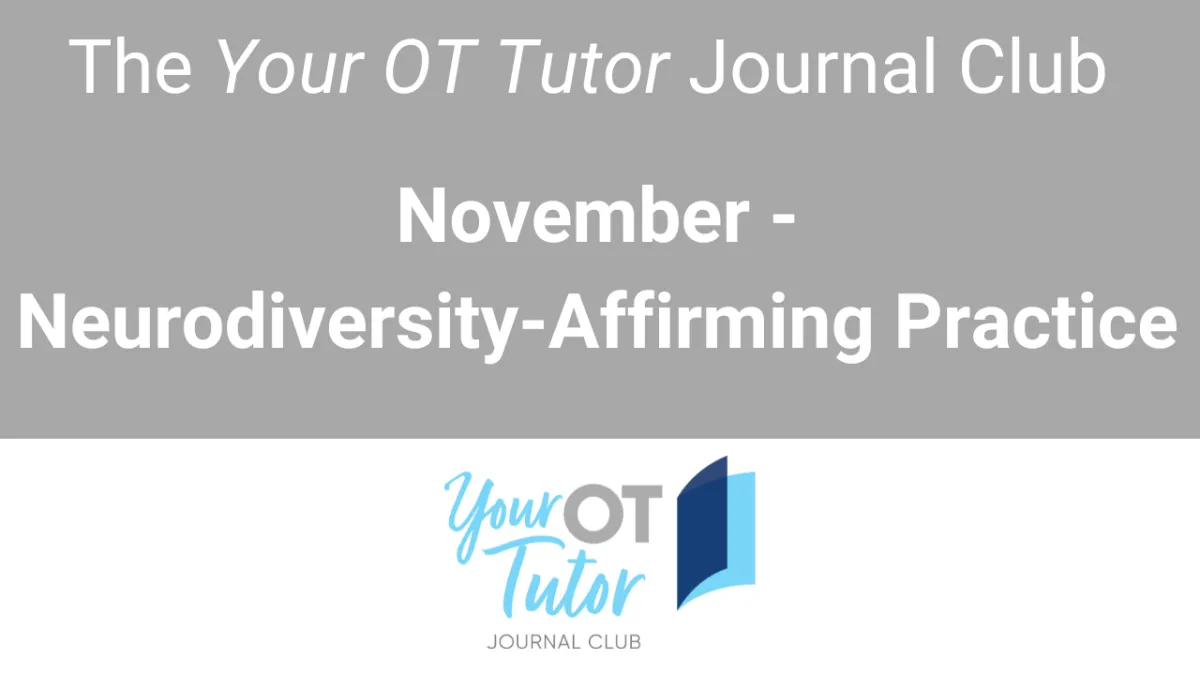
CPD for OTs - Neurodiversity Affirming Practice
The Your OT Tutor Journal Club - The Journal Club you've been waiting for!

The details you need to know...
1. What article did we discuss? We reviewed and discussed a discussion paper on how neurodiversity-affirming approaches align with OT ethical mandates and practice. Written by neurodivergent authors, the paper outlines the history of the approach and previous OT practice in relation to working with autistic clients, including the now controversial use of ABA therapies. Recommendations for how to align OT practice with a neurodiversity-affirming approach are outlined.
2. What ‘Research Fundamentals’ tip was covered in this session? We covered an overview of where to find key information in a journal article, to help you judge the quality and relevance of the article to your clinical practice.
3. What were the key points from the article critique? Five key questions were considered. The article was found to be from a trustworthy source and it was recent enough to be relevant to current practice. The author’s credentials suggested they were qualified to comment on this topic, and the suggestions they made were relevant to Westernised healthcare settings such as Australia. Their key recommendations aligned with other information and advice currently available in the literature, and overall, it was judged to be a relevant article to apply to clinical practice.
4. What were some of the key take home messages from the discussion? OTs should begin their journey towards neurodiversity-affirming practice through first reflecting on their own positionality and biases. Further learning is encouraged, with educators who are neurodivergent themselves, or where sources have been created in collaboration with neurodivergent people, being favoured. The general principles of neurodiversity-affirming OT practice are similar across paediatric and adult caseloads. OTs can be neurodiversity-affirming through using client-centred goals, incorporating client interests into sessions, acknowledging that stim behaviours have a function, and being careful with their choice of language in report writing.
5. How are OTs going to use what they learnt in this session? Attendees planned to do further reading and complete further CPD regarding Neurodiversity-affirming practice and what it looks like in their caseload. They were planning to make changes to their report writing language and share their new knowledge with team members.
SOUND INTERESTING? SIGN-UP TODAY!
You'll get unlimited access to the content so you can revisit it whenever you need to.
If you are an OT student, my mission is to turn you into proud #OTNerds that love evidence-based practice and learning, so you can access this content for FREE! Click on the button below and send evidence of your student status and you'll be given access ASAP!
If you are an Occupational Therapist (or other interested health professional - all are welcome), click on the button below to make your purchase for $25. You'll receive immediate access to the recording via the Your OT Tutor Learning Management System!
Turns out this session isn't for you, but you're still interested in being added to the Your OT Tutor mailing list? Add your details by clicking on the button below to stay up to date with the latest Your OT Tutor resources and courses.